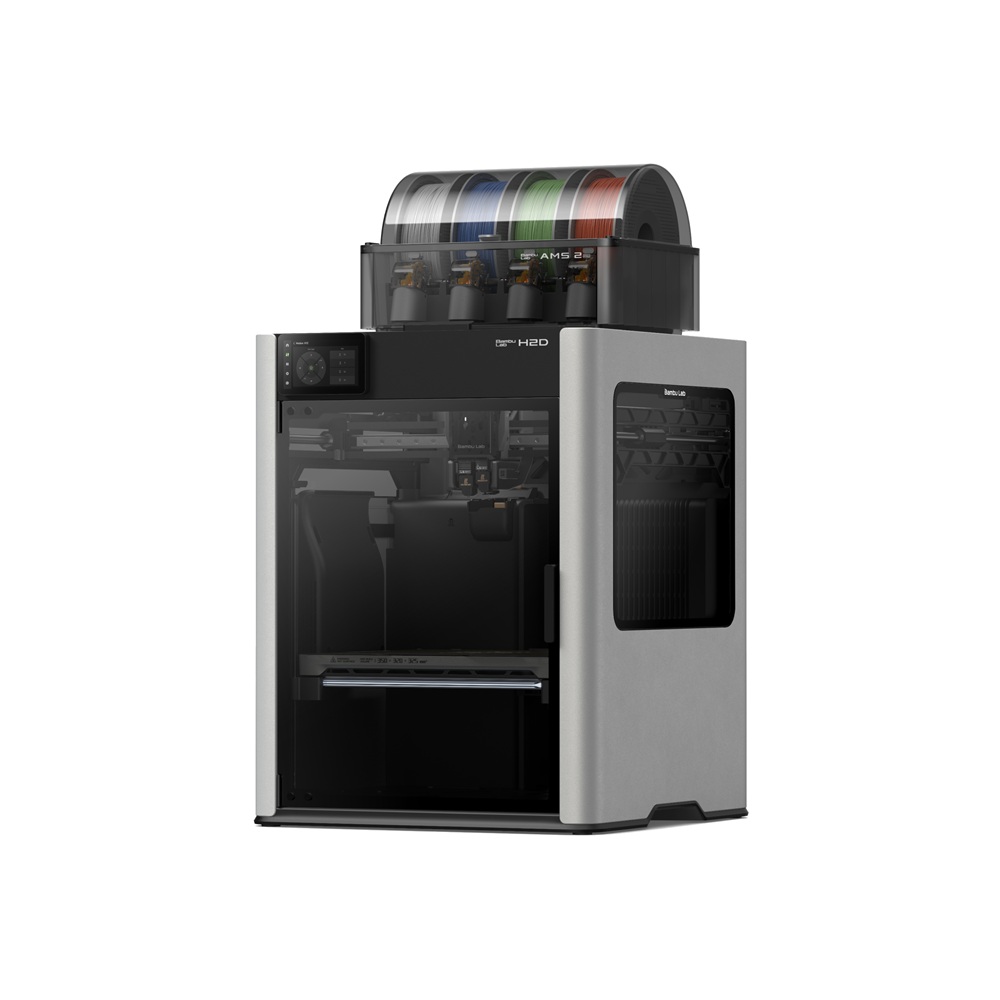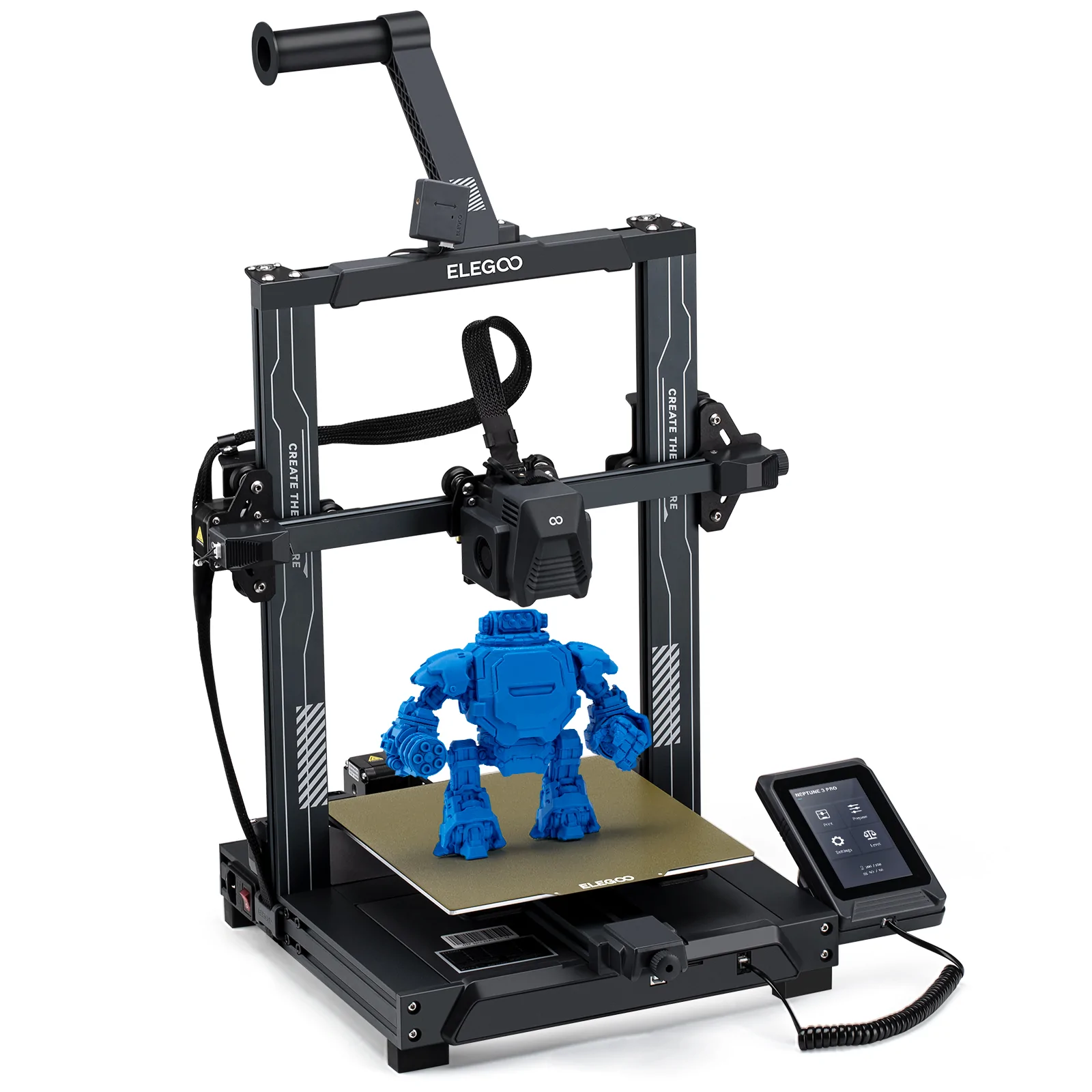Compare H2D vs Neptune 3 PRO
Comparison between the best 3D printers
Choose the best 3D printer at the best price. The cheapest 3D printers are here.
Buy a 3D printer here with 3D Fila.
 |
 |
|
| Model | H2D |
Neptune 3 PRO |
| Printing Material | Filament | Filament |
| Buy Filament for Bambu Lab H2D | Buy Filament forElegoo Neptune 3 PRO | |
| Estimated price | $1899,00 | $230,00 |
| Manufacturer | Bambu Lab | Elegoo |
| Release Year | 2025 | 2022 |
| Print Volume [mm] | 350x320x325 | 225x225x280 |
| Printer Size [mm] | 492x514x626 | 445x515x475 |
| Weight [kg] | 42,3 | 8,1 |
| Power Loss Recovery | YES | YES |
| Enclosed printer | YES | NO |
| Bed Leveling | Automatic | Automatic |
| Filament End Sensor | YES | YES |
| Bed type | Heated | Heated |
| Power supply system | Direct Drive | Direct Drive |
| Standard nozzle | 0,4 | 0,4 |
| Maximum Nozzle Temperature [°C] | 350 | 260 |
| Maximum Bed Temperature [°C] | 120 | 100 |
| Maximum printing speed [mm/s] | 600 | 80 |
| Filament holder | YES | YES |
| Camera for supervision | YES | YES |
| Recommended filaments | PLA, PETG, ABS, ASA, TPU, PVA, Nylon (PA) | PLA, PETG, Tritan, Flex, ABS |
| Recommended slicers | Bambu Studio | Cura, Simplify, Slic3r, IdeaMaker e outros |
| Maximum Resolution [mm] | 0,01 | 0,1 |
| Processor | ||
| Display | Touchscreen 5'' | Display touchscreen 4,3'' |
| Power Supply | 250 | |
| Connectivity | Wifi, Bambu bus, Cartão SD | |
| Operating systems | Windows, Mac, Linux | Windows, Mac, Linux |
| Date of registration in the system | 2025-03-31 | 2023-03-02 |
| Release date | 2025 | 2022 |
| Extra features | Bambu Labs H2D combines high-speed 3D printing with a chamber heated up to 65 °C, dual extrusion with automatic nozzle switching, an AMS for filament drying and exchange, and AI sensors that detect failures. It offers optional laser and digital cutting capabilities, features intelligent calibration through computer vision, vibration control, enhanced fire safety, and real-time camera monitoring. | The Elegoo Neptune 3 Pro printer stands out for its easy assembly and automatic bed leveling, ideal for different levels of users. Equipped with a direct-drive extruder and dual gears, it offers excellent adhesion to slippery materials such as TPU. It incorporates dual screws on the Z-axis, ensuring stable prints, and features an integrated task light for improved visibility. With a PEI-coated build plate and a detachable touchscreen, it combines functionality and convenience. The printer also features an efficient cooling system, filament sensor and a simplified user interface. |
| Support for multiple colors and materials (AMS and CFS) | YES | NO |
Notes * |
||
| Cost-benefit | 7 / 10 | 6 / 10 |
| Hardware | 7.2 / 10 | 2.4 / 10 |
| Tela | . | . |
| Print volume | 4 / 10 | 3 / 10 |
| Performance | 5 / 10 | 0 / 10 |
Conclusion |
| In conclusion, both the Bambu Lab H2D and the Elegoo Neptune 3 Pro present unique features that cater to different user needs and skill levels in the 3D printing arena. The H2D, priced at a premium, excels with its advanced capabilities, including a larger print volume, significantly higher maximum nozzle and bed temperatures, and a higher maximum printing speed, making it ideal for professionals seeking high-performance printing and versatility with different materials. The inclusion of advanced features like dual extrusion, filament management systems, and real-time monitoring further enhances its appeal for serious users. On the other hand, the Elegoo Neptune 3 Pro offers a cost-effective and user-friendly option for hobbyists and beginners. While it lacks some of the advanced features and print capabilities of the H2D, its automatic bed leveling, lightweight design, and easy assembly make it a solid choice for those new to 3D printing or operating within budgetary constraints. Both printers receive similar ratings for cost-benefit, implying that each holds value within its price range, though their hardware capabilities vary dramatically. Ultimately, the choice between these two models hinges on the user's specific needs, whether prioritizing advanced features and larger print volumes or seeking a simpler, more affordable option for casual use. |

